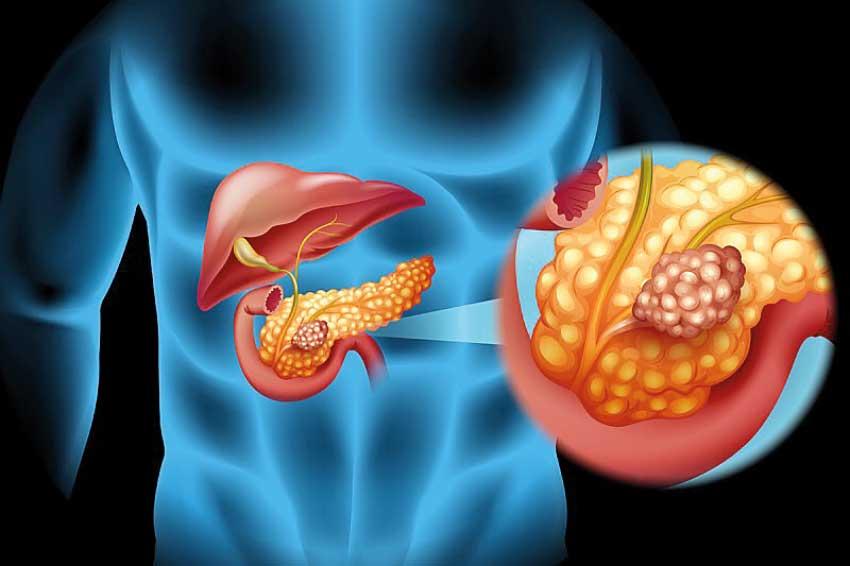26 Nov 2021 - {{hitsCtrl.values.hits}}

Pancreatic cancer can spread to the regional lymph nodes, the liver and, less commonly, to the lungs. It can also spread directly to other organs in the abdominal cavity
 Pancreatic Cancer is notorious for its insidious onset and development. This particular cancer doesn’t cause symptoms until after it has spread to other organs. This cancer reveals itself only when it has advanced to a significant extent. By the time the patient becomes symptomatic, the cancer would have advanced beyond the scope of treatment and thus, this cancer is almost always fatal. According to studies, the relative 1-year survival rate for pancreatic cancer is only 28%, and the overall 5-year survival is 7%, which means only 28 in 100 people who have pancreatic cancer will survive up to 1 year after the diagnosis is made, and only seven out of a hundred patients live up to five years.
Pancreatic Cancer is notorious for its insidious onset and development. This particular cancer doesn’t cause symptoms until after it has spread to other organs. This cancer reveals itself only when it has advanced to a significant extent. By the time the patient becomes symptomatic, the cancer would have advanced beyond the scope of treatment and thus, this cancer is almost always fatal. According to studies, the relative 1-year survival rate for pancreatic cancer is only 28%, and the overall 5-year survival is 7%, which means only 28 in 100 people who have pancreatic cancer will survive up to 1 year after the diagnosis is made, and only seven out of a hundred patients live up to five years.
The pancreas is a vital organ located deep in the abdomen, which produces enzymes that help digestion and hormones that control blood sugar levels. The head of the pancreas is connected to the first section of the small intestine through a small tube called the pancreatic duct. The pancreatic secretions reach the small intestines via this duct, and aid in the digestion and absorption of nutrients.
Cigarette (tobacco) smoking is the most commonly recognised risk factor for pancreatic cancer, and alcohol consumption would be a significant risk factor if coupled with chronic pancreatitis. A history of pancreatitis and diabetes, obesity, family history of pancreatic cancer, and possibly selected dietary factors are other risk factors. Only 5-10% are hereditary in nature. Although late-onset diabetes mellitus in the absence of family history has been noted in pancreatic cancer patients, it is believed that the cancer causes diabetes, instead of diabetes predisposing to pancreatic cancer.
The initial symptoms of pancreatic cancer are non-specific, meaning, these symptoms could occur with any disease and does not point towards a particular pathology. Since these symptoms are not specific to a certain disease, patients seldom suspect a major illness. Anorexia, where there is loss of appetite and aversion to food, nausea, bloating, fatigue, generalized body weakness and a continuous mid-epigastric or mid-back pain which is prominent at night are initial symptoms of pancreatic cancer. The pain associated with the pancreas radiates to the back. Physical examination too plays a role in diagnosing pancreatic conditions.
Weight loss can be attributed to the loss of appetite, as well as malabsorption of nutrients due to insufficient pancreatic involvement in digestion, especially when the digestive secretions are prevented from reaching the small intestine as the cancer obstructs the pancreatic duct. A characteristic sign of pancreatic cancer, when the cancer involves the head of the pancreas, is painless obstructive jaundice. In these patients, darkening of the urine, lightening of their stools and yellowish skin pigmentation could be observed, these patients could experience pruritus, and there is severe itching of the skin.
Pancreatic cancer can spread to the regional lymph nodes, the liver and, less commonly, to the lungs. It can also spread directly to other organs in the abdominal cavity. Treatment options are based on the extent of the cancer. Options may include surgery, chemotherapy, radiation therapy or a combination of these. However, even with treatment, the 5-year survival numbers of these patients are far from optimistic.
Those with chronic pancreatitis and those who have family members/first-degree relatives who have had pancreatic cancer would benefit from regular screening. Being watchful of changes in bodily functions and paying attention to the body can go a long way. Earlier the diagnosis, the better the outcome. Although fate plays a hand in the case of pancreatic cancer, a healthy lifestyle could significantly alter the chances of acquiring, surviving and preventing most diseases including cancers.
20 Dec 2024 5 hours ago
20 Dec 2024 6 hours ago
20 Dec 2024 7 hours ago
20 Dec 2024 8 hours ago
20 Dec 2024 9 hours ago